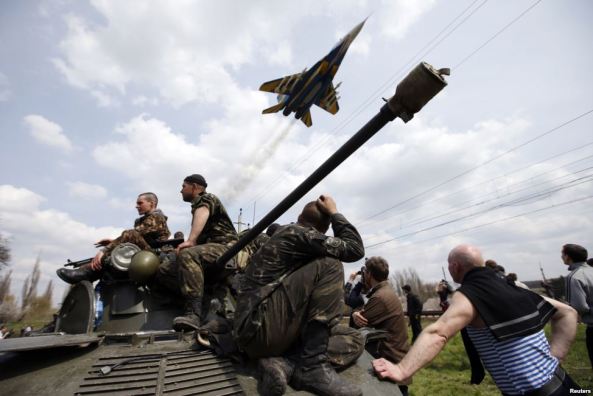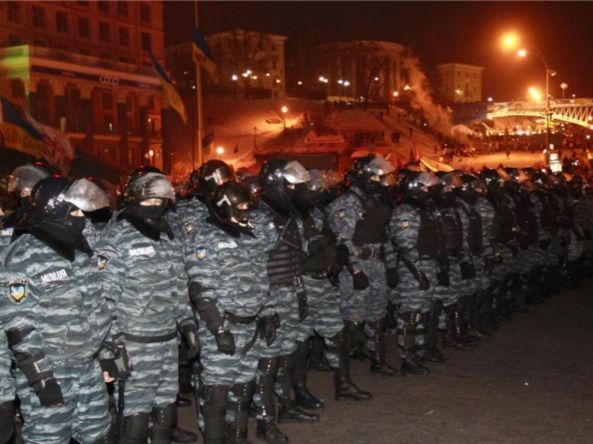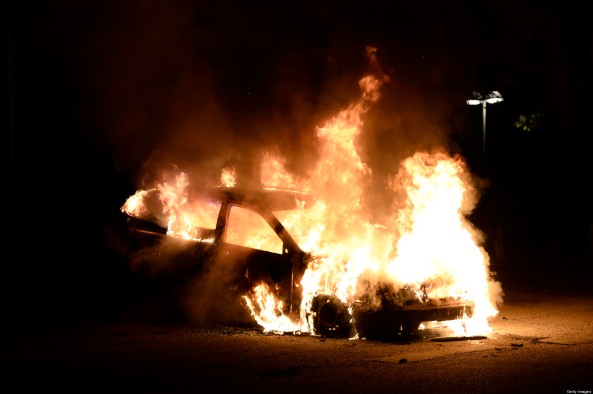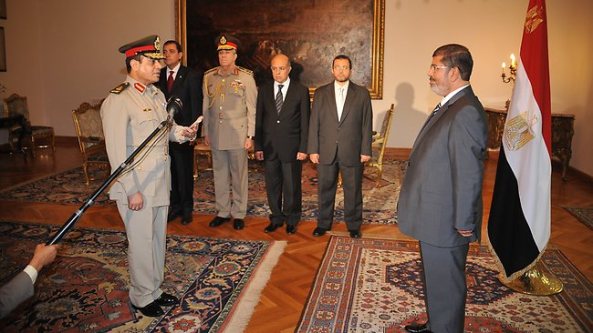Clashes at Tawkifeya [Photo: Al Hussainy Mohamed]
Egyptian President Mohamed Mursi declared a 30-day state of emergency in three Suez Canal cities yesterday, as protests begun on the second anniversary of the Egyptian revolution spread throughout the country. Police and army units fired live ammunition, killing dozens of people and injuring hundreds, while protesters attacked police stations and offices of Mursi’s Muslim Brotherhood (MB) in cities across Egypt.
The move came amid rising expectations of a decisive confrontation with police in mass protests planned for today, the anniversary of the “Friday of Rage” protests of January 28, 2011. On that day, hundreds of thousands of protesters battled police mobilized by then-President Hosni Mubarak in street fighting in Cairo. Mubarak was toppled amid a revolutionary strike wave of the Egyptian working class two weeks later.
Mursi declared a 30-day state of emergency for Port Saïd, Suez, and Ismailia, as well as a 9 p.m. to 6 a.m. curfew. The state of emergency allows the police and military to detain protesters indefinitely without charge and to prosecute them in military courts, to suspend constitutional rights, and to censor the press.
Mursi threatened to re-establish the state of emergency throughout Egypt: “I always said I’m against any exceptional measures, but I also said I might resort to such measures if I had to. I may even do more for the sake of Egypt, it’s my duty… I instructed interior ministry officials to deal strictly with whoever threatens the people, public, and private institutions.” This is an open threat to crush all opposition to the government.
Shubra march [Photo: Al Hussainy Mohamed]
Mubarak ruled throughout his 30-year presidency under a state of emergency. Mursi’s decision to re-impose it to crush protests testifies to the counter-revolutionary character of his regime.
Mursi’s announcements reportedly led to more protests against the move. In Ismailiya, a new demonstration began with calls, “Down with Mursi, down with the state of emergency.”
Egypt’s bourgeois opposition is cynically issuing calls for protests, which will occur with or without them and over which they are trying to maintain their influence, while simultaneously giving their support to Mursi’s repression. The National Salvation Front issued a statement calling for the suspension of the constitution pushed through by the MB, “retribution” for the killings of protesters, and the dissolution of the government.
However, Khaled Dawoud, a spokesman for the NSF—a coalition led by the liberal Mohamed ElBaradei, the Nasserite Hamdeen Sabahi, and former Mubarak regime official Amr Moussa—declared: “Of course we feel the president is missing the real problem on the ground, which is his own actions. His call to implement emergency law was an expected move, given what is going on, namely thuggery and criminal actions.”
The National Defense Council, led by Mursi and representatives of Egypt’s powerful army officer corps, invited the opposition to “broad national dialogue that would be attended by independent national characters.”
Army units deployed to Port Saïd and Suez yesterday, amid escalating protests over death sentences handed out against 21 fans of Port Saïd’s Al-Masry Football Club. Last year they worked with police to attack fans of Cairo’s Al-Ahly club, who had played a major role in street fighting against Mubarak’s thugs in the 2011 protests in Cairo. Some 73 Ahly fans were killed and roughly 1,000 wounded. (See also: Mass protests in Egypt against pro-junta football riot ).
At the time, MB officials criticized police and the ruling military junta, claiming the tragedy was “the result of intentional reluctance” by the authorities. Now that the MB is in power, however, they are protecting the police. While the Al-Masry thugs worked with Port Saïd police officials during the raid, the announcement of the police officials’ sentence was delayed until March 9, leading to widespread suspicions that they would be let off.
Friends and relatives of Al-Masry fans sentenced to death stormed the jails to free them, setting off a violent confrontation with police forces in which at least 30 protesters were killed, shot with live bullets and birdshot.
On Sunday the army fired on the funeral procession for those killed Saturday, scattering the procession and claiming at least three more lives.
In Suez clashes intensified Saturday, after nine protesters were killed by police on Friday. The protesters were reportedly shot with live ammunition at close range, including some from behind.
Protesters stormed the Suez police station, set prisoners free, and took police weapons. After forcing the security forces to flee, they burned down the building. As during the Friday of Rage on January 28 two years ago, police withdrew from Suez, and the Third Army was sent in to enforce security in the city and crack down on protesters.
The army moved also into Ismailiya, another city on the Suez Canal. Military reinforcements were sent to the headquarters of the Suez Canal Authority. Mursi and the Egyptian military are worried that they can lose control of the strategic waterway. Since the fall of Mubarak, strikes by Suez Canal workers have repeatedly threatened the operations at the Canal, which are critical to global trade and the US military’s presence in the Middle East.
Over the weekend, protests intensified in cities across Egypt. In the industrial city of Mahalla, protesters attacked the city’s police station with rocks and attempted to storm it. Security forces shot tear gas canisters at protesters. Protesters also attacked the Mahalla city council, throwing Molotov cocktails and rocks at the building.
As of this writing, there are ongoing protests and clashes in the capital city, Cairo. On the iconic Tahrir Square, the symbol of the Egyptian Revolution, and its surrounding streets, protesters are defying attacks by Egyptian security forces.
On Sunday demonstrators blocked the 6th of October Bridge, leading to downtown Cairo, as well as the Sadat metro station, bringing the metro traffic to a halt. On the Corniche al-Nil, security forces fired tear gas at protesters who defended themselves by throwing stones. Protesters also attacked the Ministry of Supply and Social Affairs, setting the building on fire.
Source





















